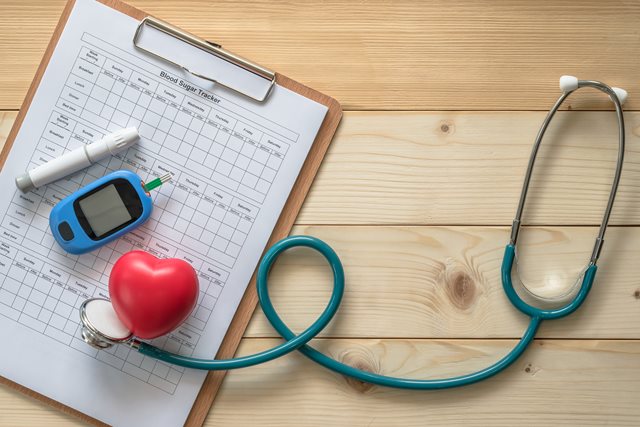A partnership that’s all about positive change
After being diagnosed with type 2 diabetes seven years ago, Jennine Buffalo broke down and cried during her first appointment with Joanne Siemens, a dietitian and diabetes educator. Jennine was aware of the disease because she had both an aunt and a cousin with type 1 diabetes; each had a leg amputation and died due to diabetes-related complications.
Joanne immediately offered Jennine a tissue from the box on her desk. They are always at the ready because Joanne knows how devastating a diabetes diagnosis can be. She then immediately offered Jennine some peace of mind.
“When people walk into my office after being diagnosed, they look like they’ve been hit by a train. And when a train like diabetes hits your life, you experience every emotion—from feeling like ‘I can beat this’ to ‘This is a death sentence,’ ” says Joanne, who works on the Maskwacis reserve, a First Nations community of 16,000 in Alberta. “Many people think they caused their diabetes because they gained weight, drank alcohol, or did something wrong. My job is to help them get rid of the guilt and shame, because the depression and self-blame that goes with diabetes can actually be worse than the actual diabetes. I tell them the reason people end up with problems is because their diabetes wasn’t well managed. And I tell them they did the right thing by coming to see me.”
The two began to meet monthly—and communicate regularly by text—to help Jennine, who was then 35, improve how she monitors her blood glucose (sugar) and to make the lifestyle changes necessary to ensure her good health.
As a result of their partnership, Jennine made lots of positive changes: She eats less red meat and more chicken and fish. Thanks to personalized cooking classes offered by Joanne, she began experimenting in the kitchen, preparing healthy dishes such as brown rice pilaf and beef barley soup. She also stopped buying pop and chips, and prepares big bowls of salad instead. And when she was unsure about how nutritious certain foods were, she'd send Joanne a text. “For example, I would ask her advice on whether pistachios are better than sunflower seeds and if I should choose salted or roasted,” says Jennine, who lost 30 pounds.
With Joanne’s encouragement, Jennine also become more active. She sings and dances at cultural Aboriginal hand games tournaments, and she and her partner and their four children regularly get out for family walks, swims in the lake and bike rides. "Our family is a lot happier now. My hope is that this [change] will help my kids grow up to be healthy adults."
An added bonus: Jennine was able to stop taking the metformin initially prescribed to manage her diabetes.
The two developed such a close and trusting relationship that Joanne even shared some of her own past struggles around weight management with Jennine. “I gave Jennine a book [Deepak Chopra’s What Are You Hungry For?] that helped me understand how to have a healthy relationship with food. I’m glad to see it also helped her on her path,” says Joanne.
After a year, Jennine had a much more positive outlook on the future.
In the beginning when I was first diagnosed, I didn’t want anyone to know I had diabetes. But I’m not embarrassed anymore. I’m alive and I’m healthy. And working with Joanne helped save my life.
Fast forward to today: Jennine has reached and maintained her weight goal. She does a lot of walking and has an A1C of 6.6. She admits to having a burger once in awhile, but otherwise she avoids fast foods and red meats. She eats a lot of vegetables, and has switched from white bread to whole-wheat and now multigrain and rye bread. She loves having fruit, berries, and nuts for snacks. She drinks mostly water and makes homemade smoothies. She loves to cook, and her latest passion is the air fryer. Her next culinary adventure will be the dehydrator.
As a result of Jennine’s increased skills and confidence, she has become more independent but still keeps in touch with Joanne, and maintains regular appointments with the medical staff at Maskwacis Health Services. “Joanne helped me see that there was a lot I could do to prevent the stuff I was so scared of. With her support and guidance, all my fears and worries were gone,” says Jennine.
A positive influence at a crucial time in life
Most teenagers struggle with a roller coaster of emotions during adolescence, but Anum Panjwani had more than her share of ups and downs. She was diagnosed with type 1 diabetes 13 years ago when she was 11, and the following year she was diagnosed with celiac disease. She loves sweets such as cakes and cookies, and takeout foods such as pizza and Chinese, but suddenly she had to think twice about every bite.
Fortunately, when Anum was 17 years old, she found a friend in Vanita Pais, a dietitian and certified diabetes educator (CDE) at Toronto’s Hospital for Sick Children (SickKids). Vanita is part of the team in the hospital’s Diabetes Clinic, which provides care for about 1,000 children with diabetes. She taught Anum when to inject her insulin and how much to inject, and about the importance of developing healthy eating habits—such as having breakfast (a meal Anum used to skip), including nutritious foods in her diet, and avoiding late-night snacking.
“I used to eat a lot of bad food—my diet consisted of things like Dunkaroos, cookies, ice cream, and chocolate, and I hated vegetables with a burning passion,” says Anum, who is now 24.
Vanita introduced me to new ways of eating and how to have a healthier lifestyle. I’m eating a lot better because of what I learned from her.
Now, Anum has breakfast every day (even if it is just peanut butter and toast), has a salad for lunch, and fills her dinner plate with veggies (zucchini pasta is a favourite meal).
Vanita also introduced her to the free MyFitnessPal app, which Anum uses on her cellphone to determine the calories and carbohydrates of the foods she eats and which also tracks her daily exercise to this day. “I find it very motivating,” she says.
Vanita also encouraged Anum’s parents and her two older brothers to come in for family sessions so they could learn how to support her in making lifestyle changes. This resulted in the whole family getting a membership at their local gym and becoming more aware of their food choices. “My whole family is eating healthy now,” says Anum. “For example, we used to have a lot of traditional rich curry dishes, which have a lot of oil and prepared sauces that are high in sodium. Now we’ve westernized them and adapted them with lighter homemade sauces.”
When Anum turned 18, she started adult care, and so after eight years, she and Vanita no longer worked together. But the lessons learned stuck with Anum, who has completed her honours health studies program at the University of Waterloo. “Although I am now at a different clinic working with a different team, the support and guidance I got from Vanita at SickKids will always stick with me." She adds, “I’ve come a long way since 2016. I have become healthier and have learnt to manage my diabetes even better as a result of what I learned. I still use MyFitness Pal and have learnt to include a diverse range of vegetables in my meals since then (although my sweet tooth has not gone away).”
Inspired by Anum’s determination to manage her diabetes, Vanita says, “It was wonderful to work with her to help her be successful. She’s a smart, passionate, and mature girl who has learned to make wise decisions. I think she will do very well in life.”
Celebrate your diabetes educator
The first Wednesday in November is Diabetes Educator Day, a chance to focus on and celebrate educators who are an important part of a diabetes team. They help you set goals and create strategies to manage your diabetes so you can live a happier and healthier life. Diabetes educators can be dietitians, nurses, pharmacists, social workers, or other healthcare professionals. Want to learn more? Contact our Diabetes Education Line. And if you work with an educator, please give them a shoutout on Facebook or another one of our social channels.
Did you know?
Diabetes Awareness Month is a time when individuals, community groups and organizations around the globe bring attention to diabetes and urge action to tackle this epidemic that affects 1 in 3 people in Canada. We’re calling on Canadians to show support for people affected by diabetes by spending their time learning more about this too-often “invisible” condition and sharing that knowledge with their communities. Learn more at Let’s Make Time to End Diabetes. #LetsMakeTime
This article appeared in Diabetes Dialogue. Photos (Vanita Pais, Anum Panjwani) by Gary Beechey, BDS Studios.
Related Content

Virtual learning
Learn more diabetes management tips and tricks by checking out one of our many options.
Get started About Virtual learning
Impact stories
Stories of inspiration from other people affected by diabetes.
Read stories About Impact stories
Tools and resources
Take charge of your health with tools and resources from Diabetes Canada.
Get started About Tools and resources